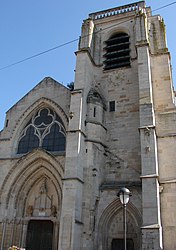Saint-Dizier (French pronunciation: [sɛ̃.di.zje]) is a subprefecture of the Haute-Marne department in north-eastern France.[3]
Saint-Dizier | |
|---|---|
Subprefecture and commune | |
 The Notre-Dame church in Saint-Dizier | |
| Coordinates: 48°38′18″N 4°56′59″E / 48.6383°N 4.9497°E | |
| Country | France |
| Region | Grand Est |
| Department | Haute-Marne |
| Arrondissement | Saint-Dizier |
| Canton | Saint-Dizier-1, 2 and 3 |
| Intercommunality | CA Grand Saint-Dizier, Der et Vallées |
| Government | |
| • Mayor (2020–2026) | Quentin Briere[1] |
Area 1 | 47.69 km2 (18.41 sq mi) |
| Population (2021)[2] | 23,068 |
| • Density | 480/km2 (1,300/sq mi) |
| Time zone | UTC+01:00 (CET) |
| • Summer (DST) | UTC+02:00 (CEST) |
| INSEE/Postal code | 52448 /52100 |
| Elevation | 146 m (479 ft) |
| 1 French Land Register data, which excludes lakes, ponds, glaciers > 1 km2 (0.386 sq mi or 247 acres) and river estuaries. | |
It has a population of 23,382 (2018 figure) and is a subprefecture of the department. Although Saint-Dizier is marginally the most populous commune in Haute-Marne, the préfecture (capital) resides in the somewhat smaller commune of Chaumont.
Geography
editLocated approximately 120 miles (193 km) east of Paris, halfway to Strasbourg, it is five miles from Western Europe's largest man-made lake, Lake Der-Chantecoq.
Climate
editThe climate in Saint-Dizier is oceanic according to the Köppen climate classification (Cfb code). However, far from any ocean or sea, Saint-Dizier experiences continental climate characteristics resulting in cold winters with freezing nights and cool days with temperatures staying in the single digits and warm to hot summers with frequent thunderstorms.
| Climate data for Saint-Dizier (1991–2020 normals, extremes 1921–present) | |||||||||||||
|---|---|---|---|---|---|---|---|---|---|---|---|---|---|
| Month | Jan | Feb | Mar | Apr | May | Jun | Jul | Aug | Sep | Oct | Nov | Dec | Year |
| Record high °C (°F) | 17.7 (63.9) |
22.6 (72.7) |
27.1 (80.8) |
29.4 (84.9) |
33.1 (91.6) |
38.1 (100.6) |
41.4 (106.5) |
40.4 (104.7) |
35.5 (95.9) |
30.3 (86.5) |
23.4 (74.1) |
18.6 (65.5) |
41.4 (106.5) |
| Mean daily maximum °C (°F) | 6.5 (43.7) |
8.0 (46.4) |
12.3 (54.1) |
16.4 (61.5) |
20.2 (68.4) |
23.6 (74.5) |
26.0 (78.8) |
25.7 (78.3) |
21.3 (70.3) |
16.2 (61.2) |
10.4 (50.7) |
7.1 (44.8) |
16.1 (61.0) |
| Daily mean °C (°F) | 3.7 (38.7) |
4.4 (39.9) |
7.6 (45.7) |
10.8 (51.4) |
14.7 (58.5) |
18.1 (64.6) |
20.2 (68.4) |
19.9 (67.8) |
16.0 (60.8) |
12.1 (53.8) |
7.3 (45.1) |
4.4 (39.9) |
11.6 (52.9) |
| Mean daily minimum °C (°F) | 0.8 (33.4) |
0.8 (33.4) |
2.9 (37.2) |
5.3 (41.5) |
9.3 (48.7) |
12.5 (54.5) |
14.5 (58.1) |
14.2 (57.6) |
10.7 (51.3) |
7.9 (46.2) |
4.1 (39.4) |
1.7 (35.1) |
7.1 (44.8) |
| Record low °C (°F) | −20.5 (−4.9) |
−22.5 (−8.5) |
−13.6 (7.5) |
−6.0 (21.2) |
−3.0 (26.6) |
2.2 (36.0) |
3.2 (37.8) |
3.7 (38.7) |
−0.2 (31.6) |
−5.1 (22.8) |
−11.7 (10.9) |
−17.3 (0.9) |
−22.5 (−8.5) |
| Average precipitation mm (inches) | 63.2 (2.49) |
61.2 (2.41) |
59.6 (2.35) |
54.6 (2.15) |
68.3 (2.69) |
57.5 (2.26) |
69.6 (2.74) |
65.1 (2.56) |
70.9 (2.79) |
75.4 (2.97) |
70.6 (2.78) |
78.5 (3.09) |
794.5 (31.28) |
| Average precipitation days (≥ 1.0 mm) | 11.1 | 10.9 | 10.2 | 9.5 | 10.4 | 9.2 | 9.4 | 8.8 | 9.0 | 11.4 | 12.1 | 13.1 | 125.2 |
| Average snowy days | 6.3 | 5.2 | 3.6 | 1.4 | 0.1 | 0.0 | 0.0 | 0.0 | 0.0 | 0.0 | 2.5 | 4.5 | 23.6 |
| Average relative humidity (%) | 86 | 81 | 78 | 73 | 74 | 75 | 74 | 77 | 81 | 85 | 87 | 86 | 79.8 |
| Mean monthly sunshine hours | 61.4 | 81.4 | 143.0 | 183.2 | 216.4 | 227.8 | 234.9 | 224.2 | 173.0 | 115.8 | 62.5 | 52.6 | 1,776.2 |
| Source 1: Meteociel[4] | |||||||||||||
| Source 2: Infoclimat.fr (humidity and snowy days, 1961–1990)[5] | |||||||||||||
History
editNamed after an unknown saint (possibly Desiderius of Fontenelle), the town originated as a fortified settlement around a thirteenth-century château, eventually becoming a royal fortress to guard the French kingdom's eastern approaches. The town was besieged and captured by Charles V, Holy Roman Emperor, in the summer of 1544. A fire in 1775 destroyed two-thirds of the town center. The château was owned by the Orléans family until the French Revolution, was a base for German troops during World War II, and currently houses the Municipal Museum.
Population
edit
|
| ||||||||||||||||||||||||||||||||||||||||||||||||||||||||||||||||||||||||||||||||||||||||||||||||||||||||||||||||||
| |||||||||||||||||||||||||||||||||||||||||||||||||||||||||||||||||||||||||||||||||||||||||||||||||||||||||||||||||||
| Source: EHESS[6] and INSEE (1968-2017)[7] | |||||||||||||||||||||||||||||||||||||||||||||||||||||||||||||||||||||||||||||||||||||||||||||||||||||||||||||||||||
Notable people
editSaint-Dizier is the birthplace of
- Baroque-era musicologist André Pirro
- Organist André Isoir
- Conductor Jean-Paul Penin
- Physicist and materials scientist Christian Janot
- Former world middleweight boxing champion Marcel Thil. A street is named in his honor
- French YouTuber Mastu, formerly Masturbatman.
See also
editReferences
edit- ^ "Répertoire national des élus: les maires". data.gouv.fr, Plateforme ouverte des données publiques françaises (in French). 2 December 2020.
- ^ "Populations légales 2021" (in French). The National Institute of Statistics and Economic Studies. 28 December 2023.
- ^ INSEE commune file
- ^ "Normales et records pour Saint-Dizier (52)". Meteociel. Retrieved 21 November 2024.
- ^ "Normes et records 1961-1990: Saint-Dizier - Robinson (52) - altitude 139m" (in French). Infoclimat. Retrieved 4 January 2016.
- ^ Des villages de Cassini aux communes d'aujourd'hui: Commune data sheet Saint-Dizier, EHESS (in French).
- ^ Population en historique depuis 1968, INSEE



